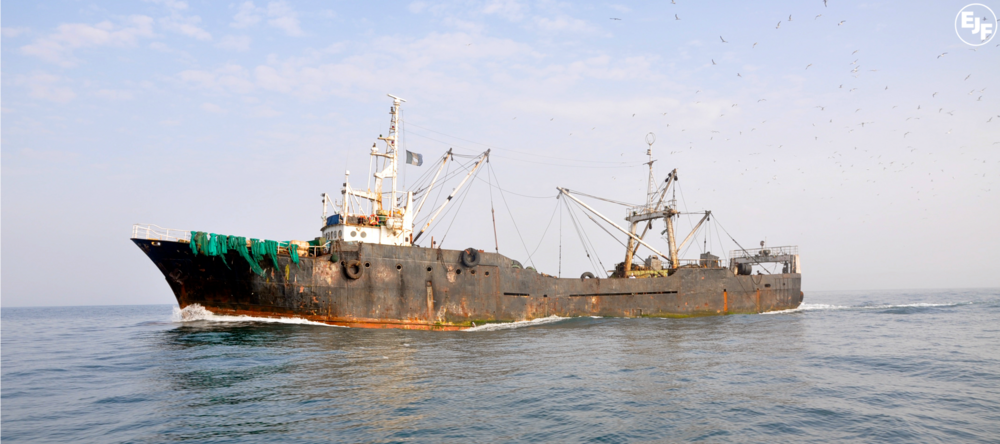
Pirate fishing vessel seized in Liberia
The fishing vessel Seta 70, believed to be illegally catching and supplying fish stolen from West Africa to the EU, has been seized by Liberian authorities.
The Liberian Coastguard, backed by the Bureau for National Fisheries and US Coastguard, has made its first fishing vessel seizure following the dramatic chase of South Korean- flagged trawler Seta 70, fishing illegally within their waters. The Environmental Justice Foundation, which has been investigating illegal fishing activities of Seta 70 since 2008, has received reports from Liberian authorities that the Liberian Coastguard chased down and seized the trawler on 22nd July after it was caught fishing illegally in inshore areas reserved for local fishers.
Seta 70, owned by a South Korean multinational company which has offices in the Canary Islands and owns a luxury golf resort on the Spanish mainland, tried to avoid capture by steering erratically and turning off its lights during the night. A Liberian government fisheries observer on board was reportedly stopped from using communication equipment by the vessel’s captain and is alleged to have been mistreated. He was reportedly able to raise the alarm by making a call on his mobile phone while hidden in a toilet.
The pursuit came to an end when Liberian authorities fired warning shots before boarding the vessel and bringing it to the country’s capital Monrovia. Earlier this year, EJF documented several vessels, including Seta 70, fishing illegally in neighbouring Sierra Leone. The vessels were catching fish for the highly lucrative European and Asian seafood markets and their illegal activities included fishing in inshore areas, destroying local fishers' nets, concealing their markings and attacking a local fisher.
Evidence collected by EJF on these vessels’ activities was provided to European authorities, leading in April 2011 to the seizure of an estimated £4m worth of fish in the Spanish port of Las Palmas. This was the largest seizure since the EU introduced a new regulation to end illegal, unreported and unregulated (IUU) fishing in January 2010.
However, earlier this month, the consignment of suspected illegally caught fish was released to the market by Spanish authorities, following months of meetings between port authorities, fishing companies and fish processors. In Spanish media, Korean fishing companies were reported to have threatened to leave the port of Las Palmas if controls on imports of fish from West Africa were not loosened. So far, Spanish authorities and the European Commission have not commented on the release of the illegal fish, which is now circulating within EU markets.
The LCG and Bureau for National Fisheries operations was supported by the US Coastguard and the World Bank-funded West Africa Regional Fisheries Program (WARFP). The WARFP provide financing and advice to West African countries to support a sustainable increase in the contribution of fisheries resources to economic growth in the region, through strengthened governance, reduced illegal fishing and increased local value added to fisheries products.
It is estimated that up to 70% of animal protein consumed in West Africa comes from fish and millions of people across the region rely on fishing for their livelihood. IUU fishing has been estimated to result in losses of US $1bn to countries in sub-Saharan Africa.
Seta 70 is still under arrest in Monrovia while investigations of the vessels activities are ongoing. Meanwhile, the Liberian government has requested that European authorities ensure that none of the illegal vessels’ catch is able to enter the European seafood market.
"The Spanish government must urgently review its decision to allow the import of fish from the Seta 70 and other vessels that are stealing fish from some of the poorest people on the planet. Weak port controls in Las Palmas mean that European consumers are unwittingly fuelling pirate fishing, a practice that devastates coastal communities, compromises food security and destroys marine environments." Steve Trent, Executive Director of EJF
SIGN UP FOR OUR EMAILS AND STAY UP TO DATE WITH EJF